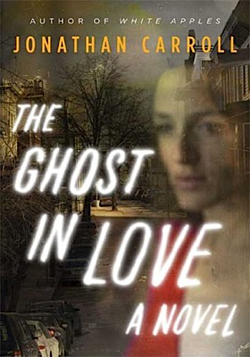The Ghost in Love

If I had not spoken with expatriate (he lives in Vienna) American writer Jonathan Carroll a few years back, I might be surprised that his online biography is bilingual (English-Polish); nor does it surprise me that, though he has authored nearly 20 well-received novels, he has managed to remain relatively unknown in the country of his birth. As a writer who once-young literary stud Jonathan Lethem terms “master of sunlit surrealism,” one explanation for Carroll’s semi-anonymity may be that his oeuvre does not fall into convenient categories. As Howard Hampton wrote in the L.A. Weekly:
The novels of Jonathan Carroll are the damndest things: as anti-modernist as they are anti-realist, they fuse mysticism with the quotidian, high, moral purpose with pop-flavored cuteness. Carroll wants to make literature that affects you the way the fables you read as a child did—that draw you into a universe of magic and wonder, that make good and evil genuine choices rather than themes.
In his latest novel, The Ghost in Love (Farrar, Straus, and Giroux), Carroll has a man who dies—but wait—he doesn’t die and the ghost sent to retrieve his soul to the afterlife is stymied. What to do under this unusual circumstance? He (the ghost) is instructed to stay with his charge until his higher-ups resolve the anomaly. In the meantime the ghost falls in love with his charge’s girlfriend. And what explains why the man didn’t die as he was supposed to? Human beings have wrested their fates from the gods: a situation ripe for the type of morality tale wrapped in fable that seems to mark Jonathan Carroll’s intentions.
